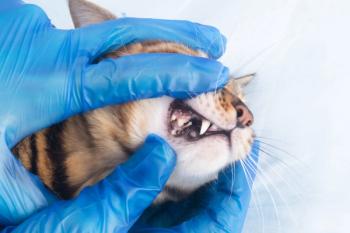
Just Ask the Expert: Persistent calculus buildup on teeth
I have noticed that in my patients that have undergone dental prophylaxis, a yellowish calculus tends to build up along the tooth surfaces-usually within six months of the cleaning.
Dr. Carmichael welcomes dentistry questions from veterinarians and veterinary technicians.
Q. I have noticed that in my patients that have undergone dental prophylaxis, a yellowish calculus tends to build up along the tooth surfaces—usually within six months of the cleaning. With only a glance, I can always tell that we have cleaned a patient's teeth in the past. I had suspected that our ultrasonic scaler was leaving microabrasions on the teeth and that the polishing wasn't removing them. So I've taken a lot more time polishing, but it hasn't seemed to help the problem. Do you have any suggestions or insight for us?
Dr. Daniel T. Carmichael
A. This is a frequently asked question. The key piece of information missing from your description of the problem is "What kind of home care has been practiced over that six-month period?" Usually the answer is none. Imagine what would happen to us if we saw the dentist twice a year but never brushed our teeth! If your clients provided daily home care, I don't think you would be seeing this problem.
A lack of polishing or inappropriate polishing is anecdotally reported to cause excessive and rapid plaque and calculus buildup. I do not think this is the case here, especially because your increased efforts have no effect. I think your patients that get professional care are the ones who need it the most because they are rapid plaque accumulators, and this confounds your observations. The goal of dental home care is to remove plaque and to retard the calculus accumulation on the tooth surface. Plaque bacteria can colonize a clean tooth in 24 to 36 hours. So within a few days of a professional dental cleaning, a pet's teeth are already accumulating the bacteria that will again cause discolored teeth, periodontal inflammation, and disease.
Daily tooth brushing is the best thing you can recommend to pet owners to promote good oral hygiene. Brushing a pet's teeth once a week, or even every three days, is not enough. Daily tooth brushing is necessary.
The toothbrush should be soft-bristled; in my experience, a battery-powered toothbrush performs well, and most dogs don't object to the vibrations. Another appropriate choice is a soft-bristled children's toothbrush. The traditional pet toothbrush, long-handled and double-ended, can be cumbersome for small breeds but is appropriate for large and dolichocephalic breeds. The toothpaste is simply a flavoring to enhance acceptance of the toothbrush. The mechanical action of the toothbrush is the main factor in removing plaque. Always discourage the use of human toothpaste in pets because it contains fluoride, which should not be swallowed. Teach owners how to brush their pets' teeth. (Go to
Several commercial diets have been shown to promote periodontal health, as compared with regular dry food diets. These foods significantly reduce the plaque, calculus, and gingivitis index for the foods tested. The mechanism of action for these dental foods is based on either enhanced kibble texture to mechanically cleanse the teeth or chemical coating of the food with polyphosphate. The polyphosphate coating binds and chelates minerals in the saliva to make them unavailable for calculus development. Therefore, the diets with enhanced texture can reduce plaque as well as calculus, whereas the chemical-coated diets are effective against calculus only.
Chew treats, such as compressed rawhide, can also help remove plaque and calculus from a dog's teeth. Plaque and calculus reduction is enhanced in rawhide treats coated with calcium-sequestering substances, such as sodium hexametaphosphate. Chew treats that have earned the Veterinary Oral Health Council (VOHC) Seal of Acceptance have been proven effective. Some chew toy products are not recommended because of their tendency to cause tooth fracture. Products such as nylon bones, cow hooves, and real bones are too hard and often are associated with slab fractures of the carnassial teeth in dogs.
Daniel T. Carmichael, DVM, DAVDC
Veterinary Medical Center
75 Sunrise Highway
West Islip, NY 11795
Newsletter
From exam room tips to practice management insights, get trusted veterinary news delivered straight to your inbox—subscribe to dvm360.




